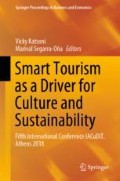Abstract
Social media have established themselves as the prominent tool enabling touristic destinations, National Tourism Organizations and online travel agencies to influence the choices of potential tourists as well as their daily travel schedule on site. This paradigm shift is complemented by user generated content which is also considered to be extremely influential albeit not always reliable and has created a monstrosity of available data both in depth and scope on the supply and demand side of the touristic business. Notwithstanding the availability of this repository of big data, the answer to the question of what is the preference and the attached perceived significance of using specific social media platforms and National Tourism Organization proprietary media still remains vague. We thus investigate the nature of the usage of social media platforms and its perceived importance reaching the conclusion that although potential tourists seem to prefer the official touristic marketing portals of NTO’s they simultaneously perceive the content as less useful than that of other social media platforms. This implies that NTO’s must update their marketing portals more often and possibly rely more on intermediate thematically focused microsites which can link to their main marketing portals.
Access this chapter
Tax calculation will be finalised at checkout
Purchases are for personal use only
References
Amaral, F., Tiago, T., & Tiago, F. (2014). User-generated content: tourists’ profiles on Tripadvisor. International Journal of Strategic Innovative Marketing, 1(3), 137–145.
Amaro, S., Duarte, P., & Henriques, C. (2016). Travelers’ use of social media: A clustering approach. Annals of Tourism Research, 59, 1–15.
Ayeh, J. K., Norman, A., & Law, R. (2013). Do we believe in TripAdvisor? Examining credibility perceptions and online travelers’ attitude toward using user-generated content. Journal of Travel Research, 52(4), 437–452.
Boyd, D., & Crawford, K. (2012). Critical questions for big data: Provocations for a cultural, technological, and scholarly phenomenon. Information, Communication & Society, 15(5), 662–679.
Chung, J. Y., & Buhalis, D. (2008). Information needs in online social networks. Information Technology & Tourism, 10(4), 267–281.
Chung, N., & Chulmo, K. (2015). The use of social media in travel information search. Telematics and Informatics, 32(2), 215–229.
Cox, C., Burgess, S., Sellitto, C., & Buultjens, J. (2009). The role of user-generated content in tourists' travel planning behavior. Journal of Hospitality Marketing & Management, 18(8), 743–764.
Fotis, J., Buhalis, D., & Rossides, N. (2012). Social media use and impact during the holiday travel planning process (pp. 13–24). Springer-Verlag.
Gretzel, U., & Yoo, K. H. (2008). Use and impact of online travel reviews. Information and communication technologies in tourism 2008, 35–46.
Gretzel, U., Yoo, K. H., & Purifoy, M. (2007). Online Travel Review Report: Role & Impact of Online Travel Reviews: Laboratory for Intelligent Systems in Tourism.
Gupta, S., & Kim, H. W. (2010). Value‐driven Internet shopping: The mental accounting theory perspective. Psychology & Marketing, 27(1), 13–35.
Halevy, A., Norvig, P., & Pereira, F. (2009). The unreasonable effectiveness of data. IEEE Intelligent Systems, 24(2), 8–12.
Hudson, S., & Thal, K. (2013). The impact of social media on the consumer decision process: Implications for tourism marketing. Journal of Travel & Tourism Marketing, 30(1–2), 156–160.
Japec, L., et al. (2015). Big data in survey research: AAPOR task force report. Public Opinion Quarterly, 79(4), 839–880.
Kaplan, A. M., & Haenlein, M. (2010). Users of the world, unite! The challenges and opportunities of Social Media. Business horizons, 53(1), 59–68.
Kim, A. J., & Ko, E. (2012). Do social media marketing activities enhance customer equity? An empirical study of luxury fashion brand. Journal of Business Research, 65(10), 1480–1486.
Mayer-Schönberger, V., & Cukier, K. (2014). Learning with big data: The future of education. Boston: Houghton Mifflin Harcourt.
Osatuyi, B. (2013). Information sharing on social media sites. Computers in Human Behavior, 29(6), 2622–2631.
Papadopoulos & Dionysopoulou (2018). The impact of social media and web 2.0 technologies in the choice of touristic destination. TOURISMOS - An International Multidisciplinary Refereed Journal of Tourism. Accepted for publication within 2018
Parra-López, E. (2011). Intentions to use social media in organizing and taking vacation trips. Computers in Human Behavior, 27(2), 640–654.
Parra-López, E., Gutiérrez-Taño, D., Diaz-Armas, R. J., & Bulchand-Gidumal, J. (2012). Travellers 2.0: Motivation, opportunity and ability to use social media. Social media in travel, tourism and hospitality: Theory, practice and cases, 171–187.
Sánchez-Fernández, R., & Iniesta-Bonillo, M. Á. (2007). The concept of perceived value: a systematic review of the research. Marketing theory, 7(4), 427–451.
Schuckert, M., Xianwei, L., & Law, R. (2015). Hospitality and tourism online reviews: Recent trends and future directions. Journal of Travel & Tourism Marketing, 32(5), 608–621.
Tufekci, Z. (2014). Big questions for social media big data: Representativeness, validity and other methodological pitfalls. ICWSM, 14, 505–514.
Author information
Authors and Affiliations
Corresponding author
Editor information
Editors and Affiliations
Rights and permissions
Copyright information
© 2019 Springer Nature Switzerland AG
About this paper
Cite this paper
Papadopoulos, G., Dionysopoulou, P., Agiomyrgianakis, G.M. (2019). Impact of Social Media and Proprietary Media on Potential Tourists Holiday Planning Process. The Case of National Tourism Organizations. In: Katsoni, V., Segarra-Oña, M. (eds) Smart Tourism as a Driver for Culture and Sustainability. Springer Proceedings in Business and Economics. Springer, Cham. https://doi.org/10.1007/978-3-030-03910-3_21
Download citation
DOI: https://doi.org/10.1007/978-3-030-03910-3_21
Published:
Publisher Name: Springer, Cham
Print ISBN: 978-3-030-03909-7
Online ISBN: 978-3-030-03910-3
eBook Packages: Business and ManagementBusiness and Management (R0)

